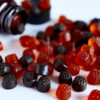Gut microbiota and its diversity change as a result of cultural, environmental, dietary, and even social factors. Ghosh et al. contribute to our growing knowledge of gut bacteria benefits by examining how the microbiome changes with age in individuals exhibiting “healthy” aging as opposed to those who age “unhealthily.” With an increasing elderly population, along with rising healthcare costs in today’s world, their meta-analysis demonstrates how gut-microbial interventions may be the key to staving off unhealthy aging and preventing expensive treatments for age-related diseases.
To begin, microbiomes in individuals above 60 years of age generally experience a decline in positive microbiota. Butyrate, a beneficial fatty acid known for its anti-inflammatory and insulin-resistant properties, as well as for facilitating programmed cell death to prevent cancer, is prominently found in younger adults. Butyrate and other helpful bacteria are replaced at later stages in life by a second group of commensal bacteria, such as Akkermansia, which serve similar functions such as preventing cellular decline and decreasing cardiovascular disease. Lastly, a third group of bacteria, pathobionts, are prevalent in groups experiencing unhealthy aging and age-related neurological and physiological decline.
The Mediterranean diet is a demonstrated diet-based intervention for unhealthy aging
Image Source: fcafotodigital
For effective microbiome interventions, the beneficial bacteria in healthy stages of aging need to be maintained, while the harmful pathobionts should be minimized. Studies have shown that taking prebiotic supplements (“food” for the helpful gut bacteria) and probiotic supplements (beneficial bacteria that are ingested directly) result in reduced insulin resistance, decreased general inflammation, and decreased neuroinflammation in elderly participants. Whole diet interventions, such as the Mediterranean diet, are beneficial for those who have minimal microbiome degradation, which can help regain gut bacterial diversity. When there is severe deterioration of the microbiome, both diet changes and biotic supplements are needed to restore beneficial taxa and maintain microbiome diversity.
Future areas for research include the best ways for the microbiome’s diversity to be repaired, as well as the required supplements or dietary steps to effectively maintain a microbiome that has been recovered through the above interventions. In order for these findings to be applicable, the authors encourage better awareness campaigns and policies, as well as making such interventions accessible by addressing wealth and education disparities within populations.
Featured Image Source: LIGHTFIELD STUDIOS










